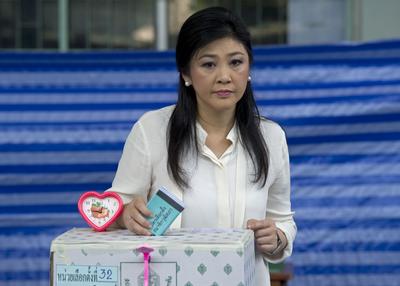The decision to void the election is part of a broader, concerted effort by Thailand’s opposition and watchdog agencies to dislodge the government of Prime Minister Yingluck Shinawatra from office. As opposing forces mount their battle plans, the protracted Thai crisis is becoming a tragic train wreck, spiralling in a political freefall that no one seems able to do much about. Sadly, the worst is to come before Thailand can start to pick up the pieces.
This round of the crisis began with the Yingluck government’s amnesty bill last October, allowing for the exoneration and return of her exiled brother, former Prime Minister Thaksin Shinawatra, who is under a two-year conviction for corruption. Thaksin’s controversial rule from 2001 until a military coup ousted him in 2006 yielded a mixed legacy. Establishment supporters loathed him as a corrupt usurper who manipulated the electoral system to line his own pockets, while rural citizens embraced his populist platform that addressed their neglected grievances, and ignored the corruption that went with it.
The amnesty bill broke an uneasy truce between Thaksin’s opponents and Yingluck, who went out of her way to appease the military, the Privy Council, and other establishment centres of power. It also sparked anti-Thaksin protests in Bangkok last November and the reformation of the anti-Thaksin coalition, which had been scattered and demoralised from electoral losses in recent years and from Yingluck’s apparent consolidation of power since winning the last election in July 2011. As the anti-Thaksin coalition gained traction through massive protests in the capital, led this time by veteran politician Suthep Thaugsuban of the opposition Democrat Party under the banner of the People’s Democratic Reform Committee (PDRC), Yingluck was forced to call an election on 9 December.
Even though Suthep succeeded in pressuring for a new poll, the Democrat Party boycotted the election. The PDRC obstructed some of the polling in Bangkok, and Democrat supporters in their southern strongholds ensured that polling yielded no clear results, including 28 constituencies without candidates. While polling in Yingluck’s Pheu Thai party heartlands in the north and northeast were completed, the south and Bangkok were problematic. The Election Commission — seen as part of the anti-Thaksin coalition — was unenthusiastic about staging the lower house polls from the outset. The lower house elections were inconclusive, and the necessary electoral reruns would have gone on for months.
However, the upper house polls on 30 March were in stark contrast. The Election Commission appeared more eager to hold the contest for Thailand’s 77 elected senators, who would be placed with another 73 appointed colleagues to comprise the upper house. The half-appointed, half-elected senate, in turn, has the authority to impeach Yingluck in cases of malfeasance.
As the lower house election became a dead end, the PDRC ramped up its street-based pressure for the caretaker prime minister to resign. But Yingluck refused, citing a constitutional stipulation that required her to remain in office until a successor is found. The protesters want to see the back of Yingluck and to bring about a political vacuum in which an appointed government can be installed to enact reforms that they say are needed to root out Thaksin’s corrupt influence in Thai politics for good.
All this has created space for watchdog agencies — the National Anti-Corruption Commission (NACC), the Constitutional Court and the Election Commission — to act. The NACC has charged Yingluck with malfeasance over her government’s rice-pledging scheme. The Constitutional Court is going after the prime minister for having transferred a senior civil servant without sufficient grounds. Government MPs and some senators are also charged with violating the constitution by trying to make the senate fully elected.
Other potential charges involve the government’s infrastructure overhaul (at a cost of 2 trillion baht), which some claim is unconstitutional, and the pro-government Red Shirts’ campaign to divide up Thailand along regional lines, which some say is treasonous. Any of these could upend the Yingluck government.
In short, Yingluck’s days are numbered. At issue now is what comes after her. If it is a government that includes both sides of the divide, Thailand may be able to navigate a way out. But if it is a partisan anti-Thaksin interim government, more tumult and turmoil can be expected.
It is true that Thaksin has corruption problems and that Yingluck does his bidding. But this would be the third time in recent history that a democratically elected government was overthrown by the establishment.
The first was a military coup in September 2006, which elicited little resistance because Thaksin’s corruption allegations held up in the eyes of most. But when the new military-inspired constitution in 2007 brought up new elections, most of the electorate opted for another Thaksin party. This was rocked by Yellow Shirt protests that culminated with the occupation of Bangkok’s main airport. The Constitutional Court then dissolved the ruling party in December 2008, and the Red Shirts took to the streets, only to be suppressed by the military in 2009 and 2010 until they had their say in Pheu Thai’s election victory in July 2011.
Thailand is going through a déjà vu. The pending ouster of Yingluck is likely to stir radicalised Red Shirt sentiments and bring them back onto the streets. Unless a new election is organised — in which the Democrat Party runs — an unelected outcome is likely. Its legitimacy will be challenged by the international community and its longevity will be tested by those angry at the abrogation of the democratic process, however flawed it may be. Thais must realise that the starting point for any democracy is the will of the majority and that autocratic rule in Thailand ultimately cannot last.
Thitinan Pongsudhirak teaches international political economy and directs the Institute of Security and International Studies at Chulalongkorn University in Bangkok.

